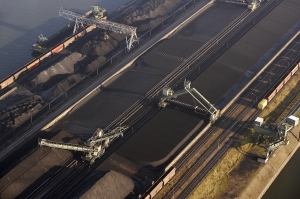


(Posted on 11/11/19)
Germany’s Coal Importers Association has released a statement following a new Deloitte study.
“Hard coal-fired power plants can take over the task of system stabilization. This was shown by the
Deloitte study " Assessing the flexibility of coal-fired power plants for the integration of renewable energy
in Germany " (Deloitte Finance, November 2019), commissioned by VDKi, with a what-if calculation.
From a purely technical point of view, the existing coal-fired power plant park in Germany (2018) could
absorb and integrate growing proportions of variable renewable energies of 50%, 60% or 70% without
endangering the reliability of the electricity supply. However, the average capacity utilisation of the
existing coal-fired power plant park (2018) would fall in the 50% renewable energies scenario to just
over 30% and in the 60% and 70% renewable energies scenarios to around 20% and 15%, respectively.
• In "dark doldrum periods", i.e. periods with limited output from wind and solar power plants, lasting
one to three days, coal-fired power plants generate twice as much electricity as on an average day
if the share of renewable energies is 50%, and three and a half times more electricity if the share
of renewable energies is 70%.
• Germany becomes a net importer during the "dark doldrum periods". The scope for compensation
through higher imports is limited by the availability of available facilities in Germany's neighbouring
countries and the overload of interconnectors.
• Almost three quarters of the installed power plant park generate heat and electricity (CHP) at the
same time. Most CHP plants can switch flexibly between heat and electricity as long as the
electricity generation is not limited by the heat demand in the cold season. Retrofitting heat
storage tanks can improve the operational flexibility of coal-fired power plants.
The study did not rely on very low gas prices for power plants. According to experts, the current price
level will not remain so in the long term. According to the current market assessment of the gas industry,
there are no suitable framework conditions for existing purely electricity-operated gas-fired power plants
to continue operating economically beyond autumn 2020.
The scope of the Deloitte study was limited to a what-if calculation. In addition, it should be noted that
only high-efficiency combined cycle gas turbine power plants should be supported under cogeneration.
Although open gas turbines and gas engines, in addition to coal-fired power plants, would currently be
an option for flanking the further expansion of renewable energy sources in the dark and cold seasons,
modern coal-fired power plants are more favourable in terms of emissions than open gas turbines. If
one considers the emissions over the entire chain of effects from the borehole/mine to the power plant,
hard coal is at least on a par with natural gas, as current studies show.
For this reason, open gas turbines or gas engines should only be built where power plant capacity is
required for grid-related reasons that cannot be provided by existing coal-fired power plants. The
Association of Coal Importers therefore appeals to all political actors to use the capabilities of flexible
coal-fired power plants to stabilise the system and thus integrate renewable energies within the
framework of the energy system transformation and to put an end to coal-fired power generation
accordingly.”
Transped S.p.A. has ordered a Konecranes Gottwald Generation 6 mobile harbour crane to expand its handling... Read more
To advance innovation and further contribute to Asia’s vibrant food ecosystem, Cargill is bolstering... Read more
Cargill RegenConnect has surpassed one million enrolled acres for the 2025 U.S. planting season, a milestone... Read more
Rio Tinto has entered into definitive agreements with GravitHy, an early-stage industrial company, to... Read more
Rio Tinto will partner with China’s State Power Investment Corporation (SPIC) to demonstrate battery... Read more
Trafigura Group, a market leader in the global commodities industry, has announced a significant expansion... Read more
Rio Tinto’s previously announced acquisition of Sumitomo Chemical Company’s (SCC’s... Read more
Vale and Jinnan Iron & Steel Group, a renowned Chinese steelmaker, have announced a joint partnership... Read more
Tariffs on Chinese steel and aluminium products have entered into force following rigorous examination... Read more
BHP have released their operational review for the quarter ended 30 September 2024.BHP Chief Executive... Read more